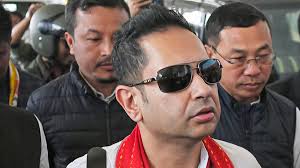Pradyot Debbarma, the founder of Tipra Motha and a prominent voice for tribal rights in Tripura, has expressed strong condemnation over the recent killings of Jiribam hostages in Manipur. He has called for immediate and decisive intervention by the Central government, urging swift justice for the victims and their families. In a public statement, Pradyot emphasized the gravity of the situation and demanded the execution of those responsible for these heinous crimes. He criticized the lack of adequate action from the government, holding authorities accountable for what he described as a failure to protect innocent lives.
The Jiribam hostage crisis has sent shockwaves across the region, stirring outrage and grief among communities. Reports revealed that the victims, taken hostage by armed assailants, were brutally killed despite appeals for their release. Pradyot, known for his impassioned advocacy for justice and human rights, took to social media and public forums to voice his anguish. He called the killings barbaric and questioned the silence of those in power, particularly highlighting the government’s inability to provide security and prevent such atrocities.
During his address, Pradyot did not hold back his frustration over the Centre’s perceived inaction. He stated that the people of Northeast India have often been neglected when it comes to critical issues like safety, infrastructure, and political stability. According to him, the government’s slow response to crises in the region reflects a pattern of indifference, further alienating communities that already feel marginalized. He urged the leadership in Delhi to prioritize the lives and well-being of Northeast citizens as much as those in other parts of the country.
Pradyot’s demand for the execution of the perpetrators stems from his belief in strong punitive measures as a deterrent against such violence. He argued that leniency or delays in justice would only embolden those who commit such crimes. While some critics may view his stance as extreme, Pradyot justified it by pointing out the systemic failures that allow such tragedies to occur repeatedly. For him, this incident is not just a case of criminality but also a reflection of deeper issues in governance and security management.
The Tipra Motha leader also connected the Jiribam killings to broader concerns about ethnic and communal tensions in the Northeast. He urged the government to address the root causes of such conflicts, which include historical grievances, socio-economic disparities, and political mistrust among communities. He warned that failure to act decisively could lead to further unrest, affecting the fragile peace in the region. He also extended his condolences to the families of the victims and offered his party’s support in seeking justice.
Pradyot’s call for intervention extends beyond immediate punitive measures. He has appealed to the Centre to take a more proactive role in resolving the underlying issues that perpetuate violence in the region. He suggested that the government work closely with local leaders and organizations to develop long-term strategies for peacebuilding. According to him, a sustained effort to bridge gaps in understanding and resources among different communities is essential to prevent such incidents in the future.
The killings have sparked widespread protests and calls for accountability from various quarters. Civil society groups, student organizations, and political parties have joined voices in condemning the incident and demanding justice. For many, the tragedy has become a rallying point to draw attention to the chronic neglect of the Northeast by successive governments. Activists have echoed Pradyot’s sentiments, urging policymakers to recognize the urgency of the situation and act accordingly.
Pradyot’s passionate response has struck a chord with many in the region who feel that their voices are often ignored in national discourse. By demanding accountability and advocating for the victims, he has reinforced his image as a leader deeply committed to the rights and welfare of his people. However, his remarks have also sparked debates over the appropriateness of capital punishment and the need for a balanced approach to justice.
The Jiribam killings stand as a stark reminder of the challenges faced by the Northeast and the pressing need for responsive and inclusive governance. As demands for justice grow louder, the government faces mounting pressure to act decisively and address the concerns raised by leaders like Pradyot Debbarma.


